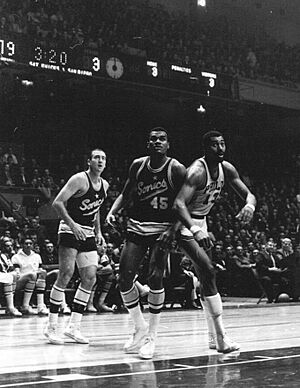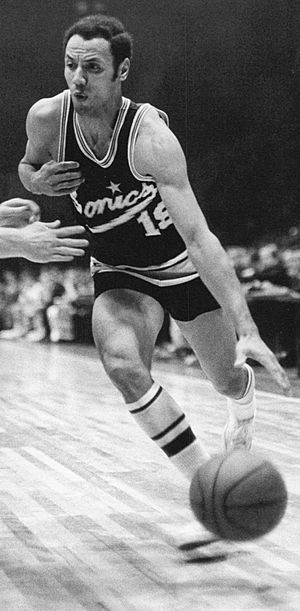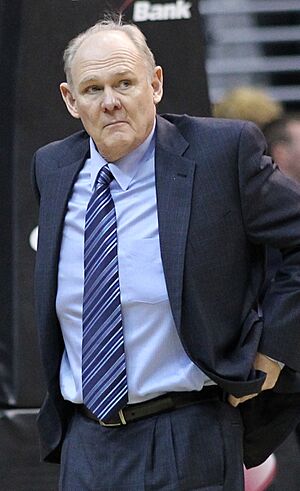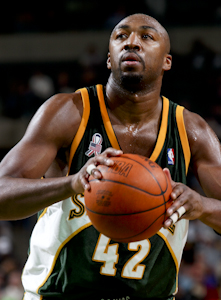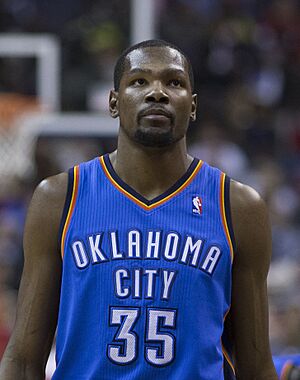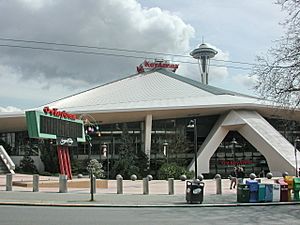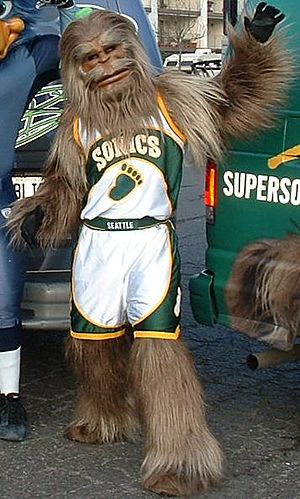Seattle SuperSonics facts for kids
Quick facts for kids Seattle SuperSonics |
|||||
|---|---|---|---|---|---|
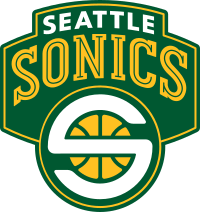 |
|||||
| Conference | Western | ||||
| Division | Western (1967–1970) Pacific (1970–2004) Northwest (2004–2008) |
||||
| Founded | 1967 | ||||
| History | Seattle SuperSonics 1967–2008 Oklahoma City Thunder 2008–present |
||||
| Arena | Seattle Center Coliseum/KeyArena at Seattle Center (1967–1978, 1985–1994, 1995–2008) Kingdome (1978–1985) Tacoma Dome (1994–1995) |
||||
| Location | Seattle, Washington | ||||
| Team colors | Green, gold, white |
||||
| Team manager | Full list | ||||
| Head coach | Full list | ||||
| Ownership | Sam Schulman (1967–1983) Barry Ackerley (1983–2001) Basketball Club of Seattle (Howard Schultz, Chairman) (2001–2006) Professional Basketball Club LLC (Clay Bennett, Chairman) (2006–2008) |
||||
| Championships | 1 (1979) | ||||
| Conference titles | 3 (1978, 1979, 1996) | ||||
| Division titles | 6 (1979, 1994, 1996, 1997, 1998, 2005) | ||||
| Retired numbers | 6 (1, 10, 19, 24, 32, 43) | ||||
|
|||||
The Seattle SuperSonics, often called the Seattle Sonics, were a professional basketball team. They played in the National Basketball Association (NBA) from 1967 to 2008. The team was based in Seattle, Washington.
After the 2007–08 season, the SuperSonics moved to Oklahoma City. They are now known as the Oklahoma City Thunder.
The team played most of its home games at KeyArena. This arena was first called the Seattle Center Coliseum. In 1979, the SuperSonics won their only NBA championship. They also won three Western Conference titles and six division titles.
When the team moved, it was agreed that the SuperSonics' history, trophies, and retired jerseys would stay in Seattle. The name, logo, and colors could also be used by a future NBA team in Seattle. However, the team's history is shared with the Oklahoma City Thunder.
Contents
Team History
How the Team Started
On December 20, 1966, a group of businessmen from Los Angeles got permission to start an NBA team in Seattle. This was the first major sports team for the city. They named the team SuperSonics because of Boeing's new SST project, which was a supersonic airplane.
The Seattle SuperSonics played their first game on October 13, 1967. They lost to the Golden State Warriors. Their first win came on October 21 against the San Diego Rockets. The team finished its first season with 23 wins and 59 losses.
The Lenny Wilkens Years
Before the next season, the SuperSonics traded for Lenny Wilkens. He was a great all-around player. Wilkens later became the team's player-coach. He also played in the 1970 NBA All-Star Game.
In 1971, Wilkens was named the All-Star Game MVP. The team also got Spencer Haywood, a very talented player. The next season, the SuperSonics had their first winning record with 47 wins and 35 losses.
In 1972, Wilkens was traded away, which many fans did not like. Without him, the team struggled. Haywood, however, continued to play very well.
Winning a Championship
In 1974, Bill Russell became the head coach. He led the SuperSonics to the playoffs for the first time. The team had players like Haywood, Fred Brown, and Slick Watts.
Russell left after the 1976–77 season. Lenny Wilkens came back as coach. The team improved a lot and reached the 1978 NBA Finals. They lost to the Washington Bullets in seven games.
The next year, the SuperSonics won their first division title in 1979. They faced the Washington Bullets again in the 1979 NBA Finals. This time, the SuperSonics won the championship in five games! Key players on this team included Gus Williams, Finals MVP Dennis Johnson, Jack Sikma, John Johnson, Lonnie Shelton, and Fred Brown.
The 1979–80 season was also strong. The SuperSonics had a great record and set an NBA record for attendance. They reached the Western Conference Finals again but lost to the Los Angeles Lakers.
A Time of Change
After 1980, some key players left the team. This led to a period where the SuperSonics did not perform as well. In 1983, the team's first owner, Sam Schulman, sold the SuperSonics to Barry Ackerley.
Fred Brown, a long-time SuperSonics player, retired in 1984. His jersey number was retired in 1986 to honor his contributions. Lenny Wilkens also left the team in 1985.
Some bright spots in the late 1980s included Tom Chambers winning the All-Star Game MVP award in 1987. The team also made it to the Western Conference Finals in 1987. Players like Chambers, Xavier McDaniel, and Dale Ellis were scoring a lot of points.
The Payton–Kemp Era
The team started to rebuild by drafting Shawn Kemp in 1989 and Gary Payton in 1990. When George Karl became head coach in 1992, the team became very competitive again.
In the 1993–94 season, the SuperSonics had the best record in the NBA. However, they lost in the first round of the playoffs, which was a big surprise.
The 1995–96 team was one of the strongest ever. They had a fantastic record of 64 wins and 18 losses. With stars like Kemp, Payton, Detlef Schrempf, and Nate McMillan, the team reached the 1996 NBA Finals. They played against Michael Jordan and the Chicago Bulls, but lost in six games.
Seattle continued to be a top team for the next two seasons. After the 1998 season, Nate McMillan retired, and Coach Karl left.
Later Years and Relocation
The SuperSonics faced challenges in the late 1990s and early 2000s. Nate McMillan later returned as head coach in 2001. In 2003, All-Star player Gary Payton was traded.
The 2004–05 team won a division title. They were led by Ray Allen and Rashard Lewis. They made it to the Western Conference Semifinals but lost to the San Antonio Spurs. This was the last time the SuperSonics made the playoffs.
In 2007, the SuperSonics got the second pick in the NBA draft and chose Kevin Durant. He was a very talented young player. However, the team traded Ray Allen and Rashard Lewis. This left the team with less talent around Durant.
The 2007–08 season was the team's last in Seattle. There were many talks about building a new arena, but they failed. Kevin Durant won the Rookie of the Year award, but the team had a very tough season.
The SuperSonics played their last home game on April 13, 2008, winning against the Dallas Mavericks. Fans chanted "Save our Sonics" throughout the game.
Moving to Oklahoma City
From 2001 to 2006, Howard Schultz, who founded Starbucks, owned the team. He tried to get money from the state government to update KeyArena, but it did not work.
On July 18, 2006, Schultz sold the SuperSonics to a group of investors led by Clay Bennett from Oklahoma City. Schultz believed Bennett would keep the team in Seattle. However, after failing to get public money for a new arena in Seattle, Bennett's group decided to move the team.
The city of Seattle sued Bennett's group to keep the team until their lease at KeyArena ended in 2010. On April 18, 2008, NBA owners approved the move to Oklahoma City.
On July 2, 2008, a deal was made. The team could move if Bennett's group paid Seattle $45 million. It was also agreed that the Oklahoma City team would not use the "SuperSonics" name. The team's history would be shared between Oklahoma City and any future NBA team in Seattle. The team became the Oklahoma City Thunder for the 2008–09 season.
In 2009, a film called Sonicsgate – Requiem For A Team was made. It tells the story of the SuperSonics and their move from Seattle.
Hopes for a New Team
After the SuperSonics left, there were many efforts to bring an NBA team back to Seattle.
Trying to Get Other Teams
A group of investors, including Microsoft CEO Steve Ballmer, tried to buy the Sacramento Kings in 2013. They wanted to move the Kings to Seattle. However, the NBA owners voted against moving the Kings.
There were also talks about buying the Milwaukee Bucks and the Atlanta Hawks. But the owners of those teams wanted them to stay in their current cities.
Arena Plans
For a while, there were plans to build a new arena in Seattle. However, these plans faced challenges. In 2016, investor Chris Hansen announced he would fund the arena without public money.
Later, another group wanted to renovate KeyArena, the SuperSonics' old home. In 2017, the Seattle City Council approved the renovation of KeyArena. The renovated arena, now called Climate Pledge Arena, was completed in 2021. It is now home to the National Hockey League (NHL) team, the Seattle Kraken. There is still hope that an NBA team could play there in the future.
Home Arenas
- KeyArena (formerly Seattle Center Coliseum) 1967–1978, 1985–1994, 1995–2008
- Kingdome 1978–1985
- Tacoma Dome 1994–1995 (during KeyArena remodel)
Team Uniforms
The first SuperSonics uniforms had "Sonics" written in a special font. The road jerseys were green with yellow letters, and the home jerseys were white with green letters.
In 1995, the SuperSonics changed their uniforms. They added red and orange colors and removed yellow. These new jerseys featured the team's new logo.
The final SuperSonics uniforms were used from 2001 to 2008. The home jerseys were white with green and gold trim. They had "SONICS" across the chest. The road uniforms were dark green with white and gold accents, saying "SEATTLE" across the chest. There was also a gold alternate uniform. These designs were a nod to older uniforms from the 1970s and 80s.
Team Rivalries
The Seattle SuperSonics had a big rivalry with the Portland Trail Blazers. This was called the I-5 Rivalry because the two cities are connected by Interstate 5. Both teams won one championship.
The SuperSonics also had a rivalry with the Los Angeles Lakers. This was because both teams were in the same division for a long time. They often played important games against each other, especially in the playoffs.
Achievements and Honors
Retired Numbers
| Seattle SuperSonics retired numbers | ||||
|---|---|---|---|---|
| No. | Player | Position | Tenure | Date |
| 1 | Gus Williams | G | 1977–1984 | March 26, 2004 |
| 10 | Nate McMillan | G | 1986–1998 1 | March 24, 1999 |
| 19 | Lenny Wilkens | G | 1968–1972 2 | October 19, 1979 |
| 24 | Spencer Haywood | F | 1971–1975 | February 26, 2007 |
| 32 | Fred Brown | G | 1971–1984 | November 6, 1986 |
| 43 | Jack Sikma | C | 1977–1986 | November 21, 1992 |
| Bob Blackburn | Broadcaster | 1967–1992 | April 17, 1993 | |
Notes:
- 1 Also head coach from 2000 to 2005.
- 2 Head coach during 1969–1972 and 1977–1985.
Basketball Hall of Famers
| Seattle SuperSonics Hall of Famers | ||||
|---|---|---|---|---|
| Players | ||||
| No. | Name | Position | Tenure | Inducted |
| 19 | Lenny Wilkens 1 | G | 1968–1972 | 1989 |
| 44 | David Thompson | F/G | 1982–1984 | 1996 |
| 33 | Patrick Ewing 2 | C | 2000–2001 | 2008 |
| 24 | Dennis Johnson 3 | G | 1976–1980 | 2010 |
| 2 20 |
Gary Payton | G | 1990–2003 | 2013 |
| 30 | Šarūnas Marčiulionis | G | 1994–1995 | 2014 |
| 24 | Spencer Haywood | F/C | 1970–1975 | 2015 |
| 34 | Ray Allen | G | 2003–2007 | 2018 |
| 43 | Jack Sikma 4 | C | 1977–1986 | 2019 |
| 44 | Paul Westphal 5 | G | 1980–1981 | 2019 |
| Coaches | ||||
| Name | Position | Tenure | Inducted | |
| Lenny Wilkens 1 | Head coach | 1969–1972 1977–1985 |
1998 | |
| Bill Russell 6 | Head coach | 1973–1977 | 2021 | |
| George Karl | Head coach | 1992–1998 | 2022 | |
| Contributors | ||||
| Name | Position | Tenure | Inducted | |
| 44 | Rod Thorn | G | 1967–1971 | 2018 |
| Rick Welts | Executive | 1969–1979 | 2018 | |
Notes:
- 1 In total, Wilkens was inducted into the Hall of Fame three times – as player, as coach and as a member of the 1992 Olympic team.
- 2 In total, Ewing was inducted into the Hall of Fame twice – as player and as a member of the 1992 Olympic team.
- 3 Inducted posthumously.
- 4 Also served as assistant coach (2003–2007).
- 5 Also served as head coach (1998–2000).
- 6 In total, Russell was inducted into the Hall of Fame twice – as a player and as coach.
FIBA Hall of Famers
| Seattle SuperSonics Hall of Famers | ||||
|---|---|---|---|---|
| Players | ||||
| No. | Name | Position | Tenure | Inducted |
| 30 | Šarūnas Marčiulionis | G | 1994–1995 | 2015 |
| 11 | Detlef Schrempf | F | 1993–1999 | 2021 |
State of Washington Sports Hall of Fame
Individual Awards
NBA Defensive Player of the Year
- Gary Payton – 1996
NBA Rookie of the Year Award
- Kevin Durant – 2008
- Dennis Johnson – 1979
NBA Executive of the Year
- Zollie Volchok – 1983
- Bob Whitsitt – 1994
NBA Most Improved Player Award
- Dale Ellis – 1987
J. Walter Kennedy Citizenship Award
- Slick Watts – 1976
NBA Sportsmanship Award
- Hersey Hawkins – 1999
- Ray Allen – 2003
All-NBA First Team
- Spencer Haywood – 1972, 1973
- Gus Williams – 1982
- Gary Payton – 1998, 2000
All-NBA Second Team
- Spencer Haywood – 1974, 1975
- Dennis Johnson – 1980
- Gus Williams – 1980
- Shawn Kemp – 1994, 1995, 1996
- Gary Payton – 1995, 1996, 1997, 1999, 2002
- Vin Baker – 1998
- Ray Allen – 2005
All-NBA Third Team
- Dale Ellis – 1989
- Gary Payton – 1994, 2001
- Detlef Schrempf – 1995
NBA All-Defensive First Team
- Slick Watts – 1976
- Dennis Johnson – 1979, 1980
- Gary Payton – 1994–2002
NBA All-Defensive Second Team
- Lonnie Shelton – 1982
- Jack Sikma – 1982
- Danny Vranes – 1985
- Nate McMillan – 1994, 1995
NBA All-Rookie First Team
- Bob Rule – 1968
- Al Tucker – 1968
- Art Harris – 1969
- Tom Burleson – 1975
- Jack Sikma – 1978
- Xavier McDaniel – 1986
- Derrick McKey – 1988
- Jeff Green – 2008
- Kevin Durant – 2008
NBA All-Rookie Second Team
- Gary Payton – 1991
- Desmond Mason – 2001
- Vladimir Radmanović – 2002
NBA All-Star Game
- Walt Hazzard – 1968
- Lenny Wilkens – 1969, 1970, 1971
- Bob Rule – 1969
- Spencer Haywood – 1972–1975
- Fred Brown – 1976
- Dennis Johnson – 1979, 1980
- Jack Sikma – 1979–1985
- Paul Westphal – 1981
- Lonnie Shelton – 1982
- Gus Williams – 1982, 1983
- David Thompson – 1983
- Tom Chambers – 1987
- Xavier McDaniel – 1988
- Dale Ellis – 1989
- Shawn Kemp – 1993–1997
- Gary Payton – 1994–1998, 2000–2003
- Detlef Schrempf – 1995, 1997
- Vin Baker – 1998
- Ray Allen – 2004–2007
- Rashard Lewis – 2005
NBA All-Star Game MVPs
- Lenny Wilkens – 1971
- Tom Chambers – 1987
NBA All-Star Game head coaches
- Lenny Wilkens – 1979, 1980
- George Karl – 1994, 1996, 1998
Staff
- Head coaches
| Coaching history | ||||
| Coach | Tenure | |||
|---|---|---|---|---|
| Al Bianchi | 1967–1969 | |||
| Lenny Wilkens | 1969–1972 | |||
| Tom Nissalke | 1972–1973 | |||
| Bucky Buckwalter | 1972–1973 | |||
| Bill Russell | 1973–1977 | |||
| Bob Hopkins | 1977 | |||
| Lenny Wilkens | 1977–1985 | |||
| Bernie Bickerstaff | 1985–1990 | |||
| K. C. Jones | 1990–1992 | |||
| Bob Kloppenburg | 1992 | |||
| George Karl | 1992–1998 | |||
| Paul Westphal | 1998–2000 | |||
| Nate McMillan | 2000–2005 | |||
| Bob Weiss | 2005 | |||
| Bob Hill | 2006–2007 | |||
| P. J. Carlesimo | 2007–2008 | |||
- General managers
| GM history | ||||
|---|---|---|---|---|
| GM | Tenure | |||
| Don Richman | 1967–1968 | |||
| Dick Vertlieb | 1968–1970 | |||
| Bob Houbregs | 1970–1973 | |||
| Bill Russell | 1973–1977 | |||
| Zollie Volchok | 1977 (or 1978)–1983 | |||
| Les Habegger | 1983–1985 | |||
| Lenny Wilkens | 1985–1986 | |||
| Bob Whitsitt | 1986–1994 | |||
| Wally Walker | 1994–2001 | |||
| Rick Sund | 2001–2007 | |||
| Sam Presti | 2007–2008 | |||
Records and Leaders
Franchise Leaders
Points scored (regular season) (as of the end of the 2007–08 season)
- Gary Payton (18,207)
- Fred Brown (14,018)
- Jack Sikma (12,258)
- Rashard Lewis (12,034)
- Shawn Kemp (10,148)
- Gus Williams (9,676)
- Dale Ellis (9,405)
- Xavier McDaniel (8,438)
- Spencer Haywood (8,131)
- Tom Chambers (8,028)
- Ray Allen (7,237)
- Detlef Schrempf (6,870)
- Dick Snyder (6,507)
- Derrick McKey (6,159)
- Lenny Wilkens (6,010)
- Bob Rule (5,646)
- Vin Baker (5,054)
- Sam Perkins (4,844)
- Nate McMillan (4,733)
- Dennis Johnson (4,590)
- Lonnie Shelton (4,460)
- Ricky Pierce (4,393)
- Brent Barry (4,107)
- Tom Meschery (4,050)
- Hersey Hawkins (3,798)
- Michael Cage (3,742)
- Eddie Johnson (3,714)
- John Johnson (3,608)
- Slick Watts (3,396)
- Al Wood (3,265)
Other Statistics (regular season) (as of the end of the 2007–08 season)
| Most minutes played | |
|---|---|
| Player | Minutes |
| Gary Payton | 36,858 |
| Jack Sikma | 24,707 |
| Fred Brown | 24,422 |
| Rashard Lewis | 20,921 |
| Nate McMillan | 20,462 |
| Most rebounds | |
|---|---|
| Player | Rebounds |
| Jack Sikma | 7,729 |
| Shawn Kemp | 5,978 |
| Gary Payton | 4,240 |
| Michael Cage | 3,975 |
| Spencer Haywood | 3,954 |
| Most assists | |
|---|---|
| Player | Assists |
| Gary Payton | 7,384 |
| Nate McMillan | 4,893 |
| Fred Brown | 3,160 |
| Gus Williams | 2,865 |
| Lenny Wilkens | 2,777 |
| Most steals | |
|---|---|
| Player | Steals |
| Gary Payton | 2,107 |
| Nate McMillan | 1,544 |
| Fred Brown | 1,149 |
| Gus Williams | 1,086 |
| Slick Watts | 833 |
| Most blocks | |
|---|---|
| Player | Blocks |
| Shawn Kemp | 959 |
| Jack Sikma | 705 |
| Alton Lister | 500 |
| Tom Burleson | 420 |
| Derrick McKey | 375 |
Single-Season and Career Leaders
Individual Leaders
|
|
See also
 In Spanish: Seattle SuperSonics para niños
In Spanish: Seattle SuperSonics para niños
- List of Seattle SuperSonics seasons
- Bob Blackburn (announcer)
- Kevin Calabro
- Wheedle
- Squatch
- Seattle SuperSonics relocation to Oklahoma City
- Sonicsgate
- Sonics Arena
- List of relocated National Basketball Association teams
 | Toni Morrison |
 | Barack Obama |
 | Martin Luther King Jr. |
 | Ralph Bunche |


